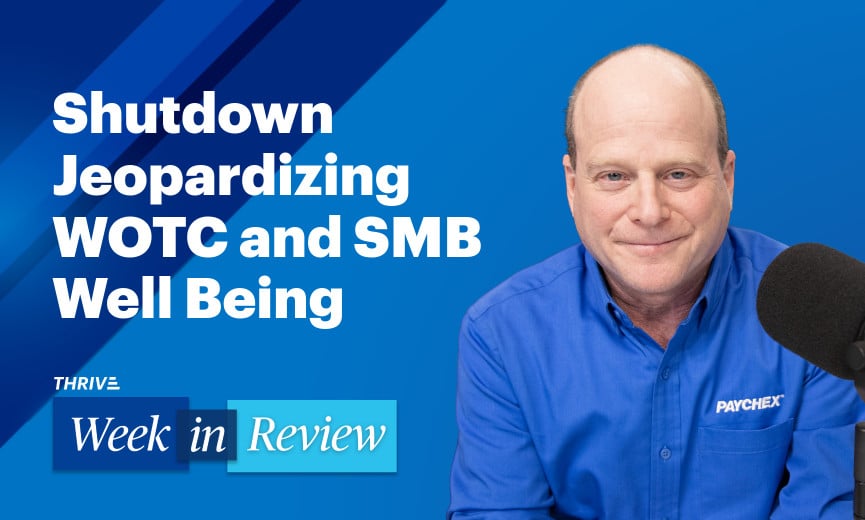- Thrive
-
Season
4Episode125
Jobs Grow for 34th Straight Month, Tax Credit Extensions Sought, SBA Training Program

Podcast •

Summary
The Paychex Small Business Employment Watch shows continued job growth for more than two-plus years and hourly wage growth, as well. Gene Marks shares what employers should be thinking about based on the data. A bill to extend some tax credits while eliminating the employee retention credit passes the U.S. House but faces a tougher test in the Senate. The Small Business Administration revamps a popular training program to educate small businesses on obtaining federal contracts. Listen to the podcast for more details and insights.
View Transcript
[Gene Marks, host]
Hey, everybody, this is Gene Marks, and welcome to another episode of the Paychex THRIVE Week in Review podcast. Thank you so much for joining me. This is a podcast where we take a few items in the news during the week and communicate them to you and then also kind of reflect a little bit on them as well. So, let's get to the news.
The first item of the news comes from Paychex actually. Dovetailing in with the Department of Labor's unemployment report last week, Paychex reported in their Small Business Employment Watch that job gains continued among U.S. small businesses to start off 2024.
According to the Small Business Employment Watch, January marks the 34th consecutive month of job growth for U.S. businesses, wage growth for workers continued to stabilize in the new year, with the hourly earnings growth remaining essentially unchanged since November of about 3.47%. So again, hourly earnings are about 3.47% increase for the month of November.
John Gibson, who is the president and CEO of Paychex, said that several economic or macroeconomic data sources pointed to a stronger close to 2023. He said that gross domestic product increased 3.3% in the fourth quarter, while the annual unemployment rate hit its lowest point since 1969, signaling federal policymakers have managed to bring down inflation and secure a soft landing without major repercussions for workers or the economy.
“Policymakers need to address the costs and access to growth for capital for small businesses,” said Gibson, “as well as the long-term issues impacting the labor market, including the participation rate and the quality of the workforce to support the continued growth of small businesses, which drives the U.S. economy.”
A few highlights on wages, which I thought you might find interesting. Remember, overall across the country, the average hourly earnings increase was 3.47%. The West had the highest earnings increase with about 4.03% – that's the Western region. Among states, Washington state had the highest hourly earnings growth of 5.17% and among cities, Seattle, 5.27% and hourly earnings growth. The construction sector has the strongest weekly hours worked among the sectors, as well.
So, the takeaway from this report, obviously, is that jobs remain strong, the job market. The economy continues to remain strong. But for you and me who are looking at salary and hourly wage increases in 2024, you know, we're at this range of about 3.5 to 4.5% is where we're at, and that's the number we should probably be targeting to make sure that our employees are getting fairly compensated at market rates because we want to retain those good people, right? That was my takeaway from this report, which was an excellent report.
Next in the news are potential tax cuts for you and me. The House of Representatives in Washington passed tax cuts for business and also for low-income families legislation. This is a report in the Wall Street Journal: the House passed a bipartisan tax cut bill that would deliver billions of dollars to companies and low-income families, overcoming election year inertia and a series of objections from lawmakers in both parties. The vote was 357 to 70 in the House. I mean, that is a rare display of bipartisanship.
It pleased many business groups and other conservatives, as well as a lot of the Democrats, as well. The Republicans themselves voted 169 to 47 for the bill. Democrats were won 88 to 23. Now, there is a big provision that's going to increase and expand the child tax care deduction – uh, credit – but before I – that's not something that we're going to talk about, the child tax credit. I want to talk about how this impacts you and your business and me, as well.
Here's what it's going to do. It's going to extend some pretty big provisions to the end of 2025. These are provisions in the 2017 Tax Act that were expiring already or about to expire, and now we're going to extend it to 2025 so that everything kind of evens up. Like all the provisions from the 2017 act are going to be expiring at the end of 2025. Now, that's another issue for another day.
So, what is going to be part of the bill? If you have research and development costs starting in 2022, you are no longer allowed to write them off in the first year. You had to capitalize them and amortize them over five years. Now, you can deduct those R&D costs right in the first year. So, that's a big tax benefit.
The other big benefit for businesses is that it would make the bonus depreciation deduction all deductible in one year. Before that, it was this past couple of years, it's been decreasing. Bonus depreciation is the amount of depreciation you can take on an asset when you buy it. For some small businesses, you know, it's more than $1,000,000. So, it's a big benefit. You can buy the asset, put it into service and then deduct it right in the year you buy it.
Well, you know, starting in 2023, you could only deduct 80% of it in the first year, then 2024. This year, it's now 60% in the first year. So, that benefit is going down. You now have to amortize those costs over a longer period of time. But this tax bill itself restores it to 100%. So, that's good.
The other thing that it does is it gets rid of the employee retention tax credit. I mean, we spend hours talking about this. There has been a lot of fraud in that tax credit, a lot of issues. And, you know, this bill would get rid of it entirely. So, it wouldn't affect the people have already applied for it, but going forward, no more people would be able to apply for it.
The bill faces big hurdles still in the Senate. So, just be aware of that. It did pass the House, but it's far from clear. It needs at least 60 votes to pass in the Senate – 60 votes, remember, not a lot of 50-50 split. The Senate is scheduled to be on recess for two weeks starting Feb. 12, so aides don't expect lawmakers to consider the tax bill before then. But keep your eyes open because there could be some tax incentives for you to spend on research development this year and buy assets, as well, if this bill passes.
Finally in the news is the Small Business Administration. The SBA has revitalized a training program to help small businesses win federal contracts. This news comes directly from the SBA. They are rebranding their 7J Management and Technical Assistance Program under a new title called Empower to Grow. The Empower to Grow program will continue to deliver its original services, but with changes that allow more accessibility and efficiency.
The SBA is also offering new features and upgrades as part of the initiative. It's offering personalized one-on-one training. It's a new-and-improved version of their federal market acceleration program. So, it's a course on government contracting taught by experts. It's adding a master class on government contracting. It's adding networking events and a bidding platform and more multilingual support, as well.
Just some data in fiscal 2023, this small business is participating in this program submitted 3,700 bids for federal contracts. Roughly 60% of those bids were successful. Over 6,000 small businesses took part in the initiative and firms receiving training reported an average increase of 45% in their annual revenue growth.
Government contracting continues to be a really great source of potential revenue for many small businesses. A lot of us are sort of daunted or intimidated by the process. This new SBA program, I think guys, can really help us get around that process and learn it much more quickly and hopefully get our hands on some of those government dollars. So again, it's the SBA 7J Program is now called Empower to Grow. Check it out. It might help you grow your business.
So, as a recap, according to the Paychex Small Business Employment Watch, we are looking at strong wage gains and strong employment gains in this past month. It's great news. So, hopefully that will continue on. The wage increases, you want to be targeting 3.5 to 4.5%.
The House has passed a big bill that could reduce our taxes, particularly on equipment purchases and research and development expenses, and eliminate the employee retention tax credit. Now, it goes to the Senate. Who will take it up, hopefully sometime later on in February.
And the SBA as revitalized a training program to help you and me get more business from the government. It's now called the Empower to Grow Program.
Thank you so much for listening. My name is Gene Marks and you have been listening to the Paychex THRIVE Week in Review podcast. I'll be back with you next week with a few more pieces of news that impact your business and some thoughts on that. Thanks.
This podcast is property of Paychex, Inc. 2024. All rights reserved.

 Apple Podcast
Apple Podcast Spotify
Spotify iHeartRadio
iHeartRadio








